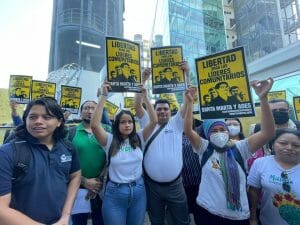NOVANEWS
A Channel to Link the Oceans, or Ortega Syndrome: US’ “Regime Change” Strategy Continues in Nicaragua
The problem is that Nicaraguan leader D. Ortega is solidly in the populist camp, shares socialist ideals, enjoys the friendship of the Castro brothers, and subscribes to the anti-US policies championed by Venezuela’s H. Chavez. Ortega is independent in foreign politics and is known to ignore Washington’s messages if they run contrary to his own plans.
The implementation of the Canal project would help the Sandinistas reinforce their positions in the country and the ALBA bloc – its influence on the continental level. Ortega is a vocal proponent of the concept that the construction of the waterway is the cause to benefit entire Central America.With the US ambitions to maintain undivided control over the Asia Pacific region, the US Administration deems it necessary to oppose the initiative aimed at creating a transit route outside of its control, even if a different approach could prove to be more practical.
The Canal managed by Ortega’s regime is seen in Washington as a threat to the US interests.Washington is particularly allergic to the part of the plan which implies that Iran should invest in the construction. A US tradition since the G. Bush epoch is to condemn Ortega’s policy of engaging with Ahmadinejad and to allege that Nicaragua somehow cooperates with Hezbollah.The Western media revive frequently the myth of the Iranian threat in Central America.For example, an Israeli radio station aired a fake report about a Hezbollah training base functioning in the north-eastern part of Nicaragua.
The Washington Post blew out of proportions the news that some huge building was being constructed in Managua for the Iranian embassy. The account took little time to be identified as another lie, but US Secretary of State H. Clinton cited it in an attempt to expose Tehran’s “terrorist” plans.Talking to ambassador Powers at her inauguration ceremony, Ortega suggested switching to a friendlier than before mode of relations. The US embassy has a reputation for propping up the resistance to Ortega’s allegedly authoritarian rule. The book by Nicaraguan Army colonel Victor Boitano published recently in the country gives a good idea of the intensity of the CIA subversive activity against it.For a period of time, the author, was connected to the CIA station in Managua.
He identified the CIA agents whom he met at secret locations, some of the people being politicians or journalists, and also published a letter with the CIA instructions along with an array of similar documents.Boitano details the steps taken by the CIA to compromise the November, 2011 elections in Nicaragua and the roles played in the process by agents of influence from other Latin American countries such as Costa Rica, Columbia, Mexico, Argentina, and Salvador.According to Boitano, Washington poured $30m into Nicaragua in a hope to plunge the country into chaos. Still, the operation produced no result and Ortega emerged as the winner
[ed notes:im just citing few excerpts,click link for whole piece and also
see… ISRAHELLI PRESS INVENTS LIES ABOUT … – THENAKEDFACTS MUST SEE(CENSURED IN UNITED STATES)OPPOSITION PARTY MEMBER AND NICARAGUAN EX MILITARY COMMANDER EXPOSES US PLOT
Posted by Nysoulcontrolla aka Ali




